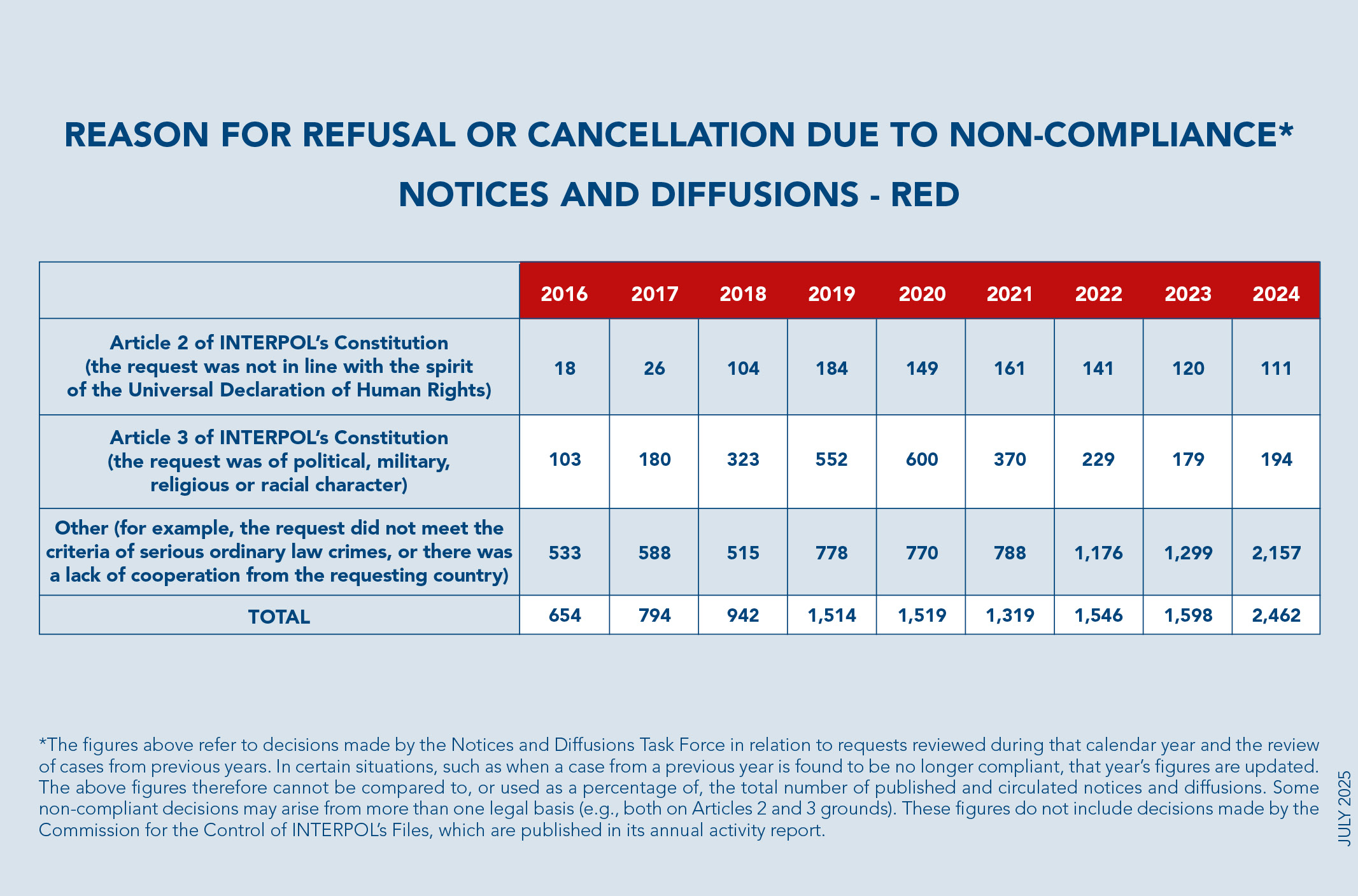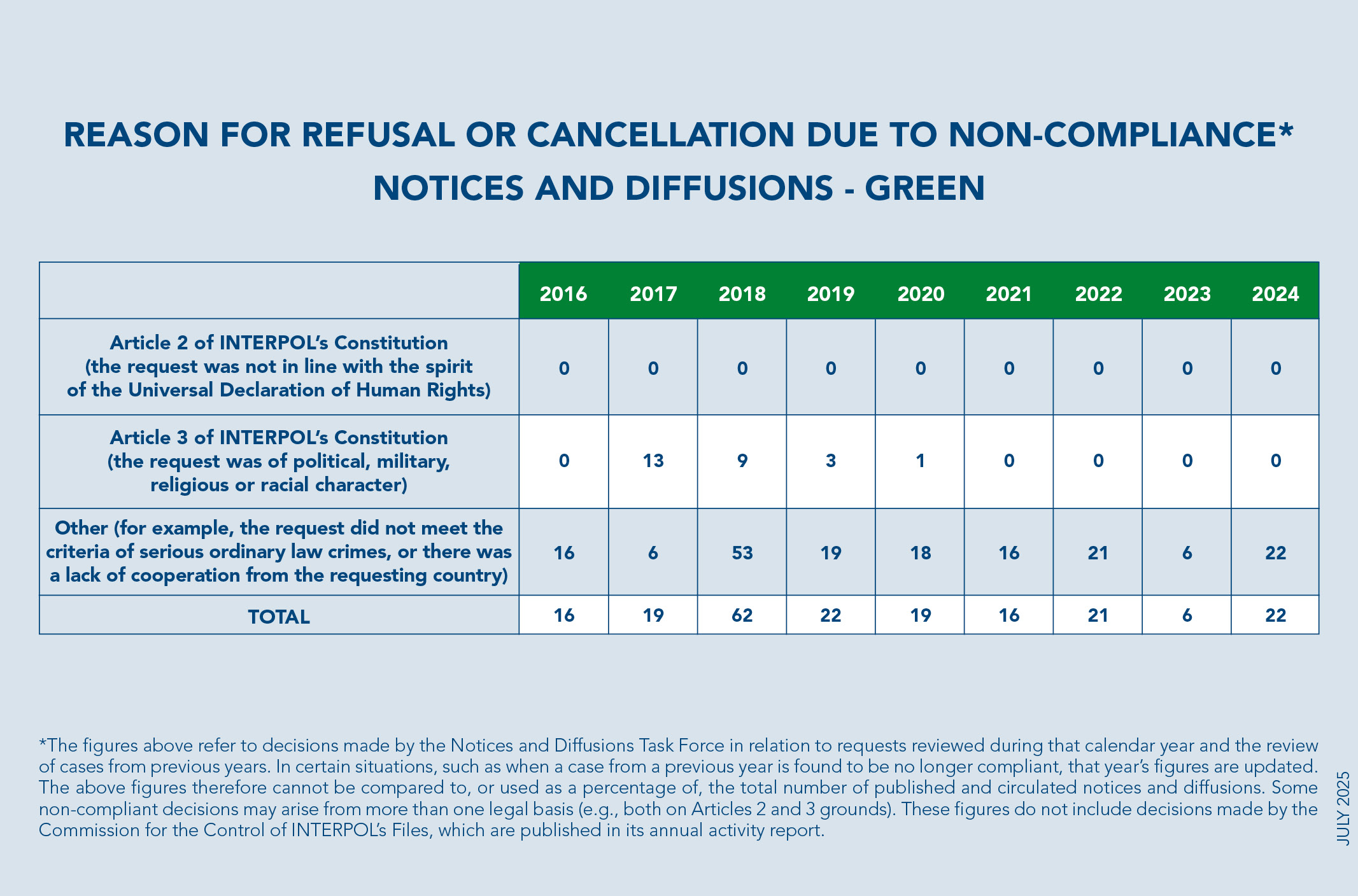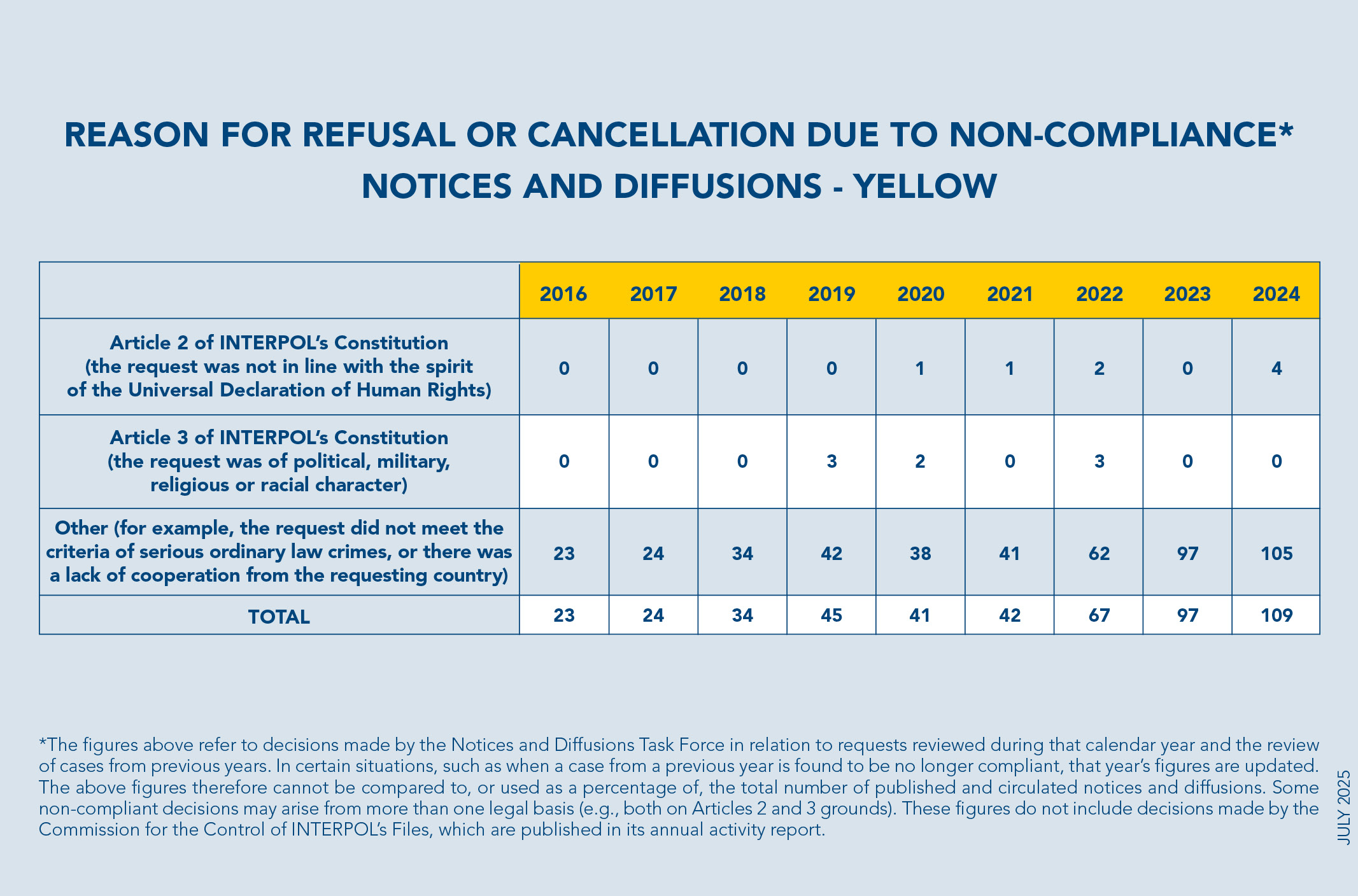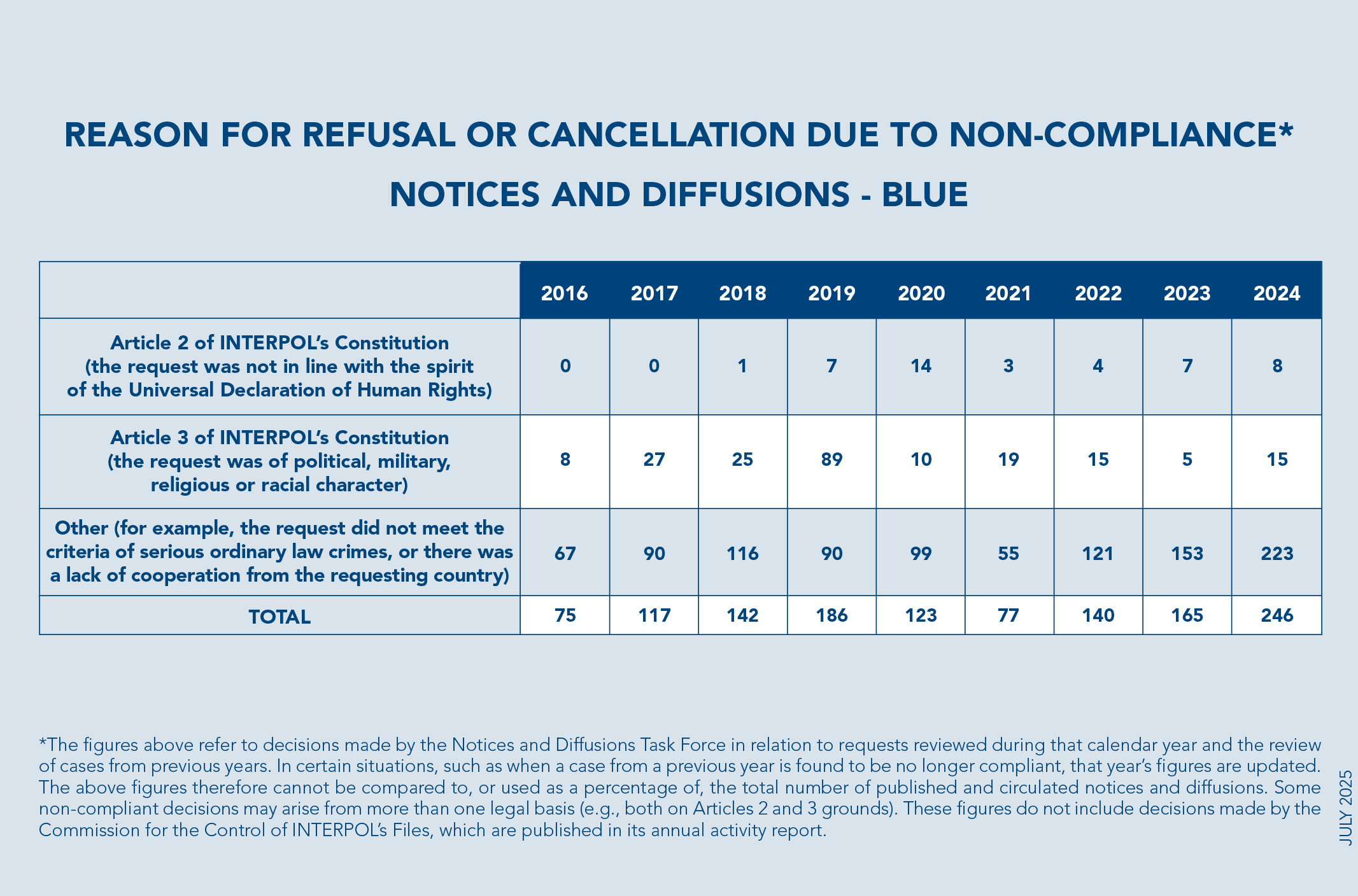INTERPOL Notices and Diffusions must comply with the Organization’s Constitution and Rules on the Processing of Data (RPD).
Notices and Diffusions Task Force
Member countries are primarily responsible for ensuring their requests comply with INTERPOL rules, national laws and international obligations. In accordance with Articles 22, 74 and 128 of the RPD, the INTERPOL General Secretariat is tasked with examining the compliance of Notices and Diffusions.
To reinforce this capacity, in 2016 INTERPOL created a dedicated multidisciplinary team: the Notices and Diffusions Task Force (NDTF). Comprised of lawyers, police officers and operations specialists with a wide range of experience and language skills, the NDTF conducts a robust quality and legal compliance review of incoming Notice and Diffusion requests prior to their authorization by the General Secretariat.
Since 2018, the NDTF’s role has expanded, taking on the continual review of existing Red Notices and Wanted Persons Diffusions (WPDs), including those issued before 2016. The NDTF also delivers training and develops guidance on INTERPOL Notices and Diffusions for member countries.
Scope of review
The review of Notices and Diffusions is based on core INTERPOL documents: its Constitution, the Rules on the Processing of Data (RPD), General Assembly Resolutions, and the Repository of Practice on Articles 2 and 3 of the Constitution. These documents are all publicly available in the Legal Framework section of this website.
When conducting its review, the NDTF verifies that the Notice or Diffusion satisfies the requirements of the RPD (in particular, Articles 82-99) regarding identity details, judicial data, purpose and other criteria.
The NDTF examines whether the requested Notice or Diffusion is compliant with Articles 2(1) and 3 of INTERPOL’s Constitution, which state, respectively, that the Organization must conduct its activities in the spirit of the Universal Declaration of Human Rights, and that it is strictly forbidden for the Organization to undertake activities of a political, military, religious or racial character.
General Assembly Resolutions have interpreted these articles with regard to areas such as terrorism, crimes against humanity, and refugees.
Relevant information, including from external sources, is examined to ensure that data contained within a requested Notice or Diffusion comply with INTERPOL rules. For example, the NDTF assesses the status of the individual concerned (is the individual, for instance, a political activist or refugee?) and the general context of the case (e.g. was the Notice submitted in the context of domestic political unrest or an inter-state dispute?).
The practice of the NDTF in applying the rules enshrined in the INTERPOL Constitution is reflected in the Repository of Practice on Articles 2 and 3.
The review process
Thousands of Notices and WPDs processed by INTERPOL each year go through the following review process.

Initial screening
The NDTF screens incoming Notice and Diffusion requests and identifies those that require further review. The latter are identified through:
- Technological tools identifying compliance risks, which are taken into consideration in the subsequent review.
- Geopolitical information about situations within or between member countries that may indicate a particular need for caution when assessing compliance. This could include, for instance, a recent change of political power in a country or a dispute between two member countries.
- Other information from INTERPOL databases, exchanges with member countries or external sources that could indicate non-compliance. This could include information that the subject of a Notice was granted refugee status in another country.
Further review
If a doubt on compliance arises during the initial screening, the NDTF will engage in further review. This may include seeking additional information from the requesting National Central Bureau (NCB) (such as additional judicial data) or information from other NCBs. For example, if information indicates that an individual has been the subject of an extradition request from Country A to Country B, INTERPOL may ask the NCB in Country B to provide information on the outcome of the request, including any reasons that an extradition was refused.
Outcome – Authorization or denial
Ultimately, the NDTF will either authorize or deny each request for the publication of a Notice or recording of a Diffusion. Notices approved by the NDTF are published by the General Secretariat and notified to NCBs in all INTERPOL member countries.
When a request is denied, the requesting NCB is informed of the decision and the underlying reasons. Where data was already circulated to member countries prior to review (for example, in the case of a WPD), the General Secretariat will inform NCBs in all recipient countries of the decision and request that they update their national databases accordingly.
If a Notice or Diffusion is denied because of non-compliance with Article 2(1) or 3 of the INTERPOL Constitution, no further cooperation is allowed to take place via INTERPOL. A decision by the NDTF to deny a Notice or Diffusion has no impact on the validity of the criminal proceedings in the requesting country, and does not prevent international cooperation using channels outside of INTERPOL.
Visibility of data to member countries
Incoming Red Notice and WPD requests are not visible to member countries through the INTERPOL Information System (i.e. not searchable in the databases) until they have been reviewed and authorized by the NDTF. WPDs, unlike Red Notices, are immediately received by recipient NCBs in member countries in an email format before the conclusion of the NDTF’s review. However, the email warns that these Diffusions are subject to legal review and have not been authorized by the General Secretariat.
The data contained in other types of Notices and Diffusions are immediately visible to member countries through the INTERPOL Information System, though they are subject to a warning mentioning that their review has not been completed. If, during a review, any doubt arises on the compliance of a visible Notice or Diffusion, the NDTF may decide to provisionally block the visibility of the data pending the outcome of the review.
Review of existing Notices and Diffusions
The NDTF systematically reviews existing Notices and Diffusions, with a particular focus on Red Notices and WPDs. The criteria for reviewing existing Notices and Diffusions are the same as for incoming requests, and the NDTF may decide to provisionally block their visibility pending review if a doubt over compliance arises – including through new information brought to the attention of the NDTF. Existing Notices and Diffusions considered non-compliant are cancelled and the relevant member countries informed.
Red Notice deletion
When the General Secretariat deletes a Red Notice it is immediately removed from INTERPOL’s databases. A notification on deletion of Red Notices is sent to all member countries every 24 hours. If the deletion derives from a finding by the General Secretariat that the Red Notice is not compliant due to Article 2 and/or 3 concerns, the NCB of the requesting country is also advised not to use INTERPOL’s channels in this matter.
In addition to the above, a weekly notification is sent to all countries informing them of the CCF’s decisions on deletion advising them to update their national databases, and not to use INTERPOL’s channels.
A certificate informing that the individual is no longer subject to a Red Notice may also be issued. If the individual nonetheless encounters difficulties when travelling, the countries concerned are reminded of the Red Notice’s deletion and the need to update their national databases.
Whether the notice was cancelled by the General Secretariat or the CCF, the General Secretariat remains vigilant to any new submissions of data concerning the same individual. However, the country which requested the Red Notice, may keep the individual on their own domestic wanted list, and police authorities may use other, non-INTERPOL channels to alert other countries either bilaterally or through regional agreements.
Application of interim and corrective measures
If a particular member country continually requests Notices and Diffusions that are not compliant with the Organization’s rules, the General Secretariat may decide to apply interim or corrective measures to that country’s NCB. The measures, which can vary depending on the situation, may include enhanced review of all Notices and Diffusions from a certain NCB or a partial or full suspension of processing rights, including the right to request Notices or Diffusions. Long-term suspension of processing rights requires the approval of INTERPOL’s Executive Committee.
Interim or corrective measures are meant to ensure compliance with INTERPOL’s rules and facilitate improvements in the use of its channels.
In INTERPOL’s practice, since the entry into force of the RPD in 2012, interim and corrective measures have been applied with regard to different NCBs on different occasions.
Related documents

Related news











